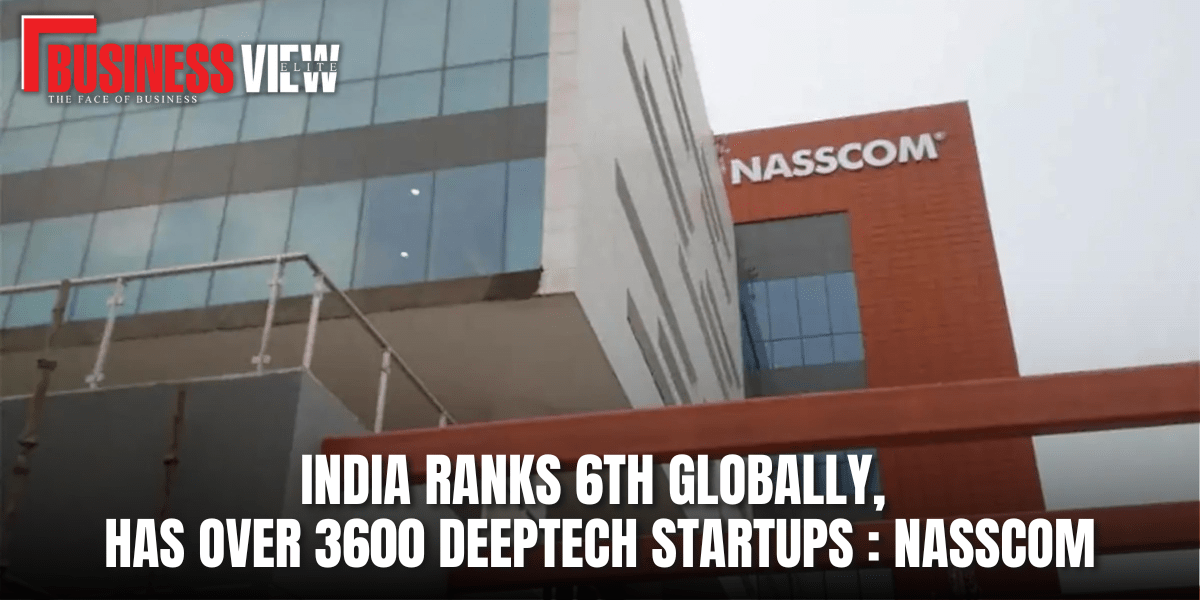India Ranks 6th Globally, has over 3600 Deeptech Startups
Since 2022 India’s deep tech ecosystem has witnessed a twofold increase. From a total of 3,600 startups,over 480 were established last year, as reported by Nasscom and Zinnov. These startups secured $850 million in funding in 2023, propelling India to sixth place globally among deep tech hubs.
New Delhi: On Thursday, a Nasscom (National Association of Software and Service Companies) report said that these DeepTech startups secured $850 million in funding in 2023, putting India in sixth place globally among deep tech hubs. Last year there were 480 new startups among which, more than 100 are spearheading intellectual property creation and innovative solutions across various domains. 74% of these deep-tech startups focus on Artificial Intelligence. From 2014 to 2022, there were only 62% deep-tech startups that focused on Artificial Intelligence.
The second edition of Nasscom and Zinnov launched a report titled “India’s DeepTech Dawn: Forging Ahead”. This was the second edition of Nasscom and Zinnov’s DeepTech startup landscape report series. This report discussed trends like funding, mergers and acquisitions, intellectual property developments, economic growth, technology, and sector-specific focuses. The report also shed light on the challenges faced by the DeepTech ecosystem and what necessary actions were needed to address and eliminate them.
Nasscom’s report reveals that India’s DeepTech ecosystem has seen rampant growth. Backed with sturdy investments and a regulatory framework working in its support. India’s rapidly expanding talent pool is another factor contributing to its graph. This report also highlighted that over the past five years, the number of DeepTech startups in India has doubled in number. This data clearly sheds light on the growth of the Indian startup ecosystem.
This report also acclaimed that Bangalore, Mumbai, Delhi-NCR, and Hyderabad are the central hubs for DeepTech startups in India. The reason behind this could be their easy access to abundant talent, the academic institutions that shelter the sharpest Indian minds, and a powerful network of investors. These cities have become the go-to for entrepreneurs who are looking to create startups that solve local or global inconveniences and come up with solutions.
DeepTech startups in India are making an impact in some industries more than in others. The report also outlines the key sectors that are benefitting from these startups the most. Startups arousing artificial intelligence and machine learning to improve diagnostics, medicine, and patient care in the healthcare industry. Technologies such as precision farming and predictive analytics are increasing crop yields helping in resource management and supporting the agriculture industry.
Government initiatives like Startup India and Digital India also helped create an environment for DeepTech innovation to thrive. These initiatives by the government served the Indian entrepreneurs by simplifying regulatory processes and providing access to funding.
Agnikul, GalaxyEye, HealthPlix, Sarvam AI, and Peptris, are some DeepTech startups and emerging leaders in sectors such as healthtech, sustainability, AI, and space-tech.
Jeyandran Venugopal, the Chair of Nasscom DeepTech Council gave the statement - “Areas such as AI, quantum computing, space-tech, next-gen robotics, and others will come together in interesting ways and be applied across every domain from education, entertainment, commerce, agriculture, industrial manufacturing, mobility, and several others,”. He further added to his statement that - “India, with its deep talent base and traditional strength of producing top-notch STEM talent, is well positioned to play a dominant role in this technology-led societal transition process,”
Although India ranks third in the technology startup ecosystem, India currently holds the sixth position for DeepTech startups in the world.
Kritika Murugesan, Head of Nasscom DeepTech, explained the situation with the statement- “For India to be in the top three deep tech startups ecosystem, key areas that need support are access to patient capital for DeepTech startups, strong R&D partnerships with academia and implementation of the deep tech policy that was tabled in 2023″.


